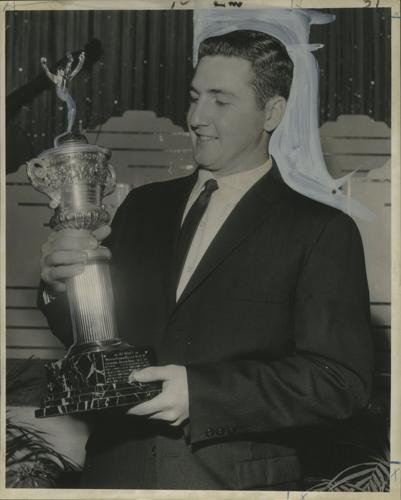Back when Jake Gibbs would bring his Ole Miss baseball teams to LSU, someone would inevitably bring a boombox and serenade him with a recording of Billy Cannon’s 1959 Heisman-clinching return of Gibbs’ punt in the 7-3 classic between the Rebels and the Tigers.
“It started out, ‘Gibbs is back to punt,’ and it ended ‘He goes by Gibbs and he scores,’ ” Gibbs recalled. “I really thought it was pretty funny because Alex Box was right across the street from the football stadium, so they didn’t have to remind about it.”
“But when you’re coaching third base, you can’t have rabbit ears. So I acted like I wasn’t paying attention and didn’t say anything back to them.”
Actually, if he'd been of a mind to, Gibbs could have turned around and reminded his would-be antagonizers, “21-0.”
That was the score by which Ole Miss gained its revenge in a the first regular-season rematch in Sugar Bowl history.
“We heard they didn’t want to play us again, but we sure wanted them,” said Gibbs, whose 43-yard touchdown pass to James “Cowboy” Woodruff just before halftime gave the Rebels all the points they would need. “The way I figured it, we gave them a big break in the first game and they gave us one in the second.”
A year later, Ole Miss was back in the Sugar Bowl, this time to face Rice. And again, the Rebels won. Gibbs scored both of his team’s touchdowns to earn a 14-6 win and the only national championship in school history.
For his efforts against Rice, Gibbs won the Miller-Digby Trophy as the game’s outstanding player.
Gibbs was a consensus All-American quarterback in 1960. He finished third in the Heisman balloting and was drafted by the NFL's Cleveland Browns and AFL's Houston Oilers. But that Sugar Bowl turned out to be Gibbs’ final football game.
Instead, he signed with the New York Yankees for a $100,000 bonus and had an eight-year career in Major League Baseball. After his retirement in 1971, Gibbs became the baseball coach at his alma mater, guiding the Rebels to the Southeastern Conference championship the College World Series in his first year.
He eventually retired from that post in 1990 with more than 400 victories.
Six decades after his football career ended, though, Gibbs' gridiron exploits have not been forgotten.
Saturday, Gibbs joins six others — players Doug Moreau of LSU, Jimbo Colvert of Pittsburgh, Tony Davis of Nebraska, Woodrow Lowe of Alabama and Walt Yowarsky of Kentucky, along with Georgia Tech coach Bobby Dodd — being inducted into the Sugar Bowl Hall of Fame.
Fittingly, it comes on a night when the Rebels are back in the Sugar Bowl, facing Baylor.
“I’d be there anyway,” said Gibbs, now 83 and living in Oxford, 40 miles from his home town of Grenada, Mississippi. “But now I’m coming for sure.
“We’ve got an offense that can move the ball on anybody and the coaches have them really cohesive and playing together. I’ve really enjoyed this season, and this tops it off.”
Gibbs’ selection gives Ole Miss four Sugar Bowl Hall of Famers, along with Archie Manning, Raymond Brown and Johnny Vaught, Gibbs’ coach. That ties the Rebels with Alabama and Georgia for the most inductees.
It was Manning, whom Gibbs tutored in the fall after the Yankees’ season was over, who informed him about the honor.
“Jake was my idol,” Manning said. “And then it was my good fortune to be at Ole Miss when Jake would come over every day after his season was over and work with me and the rest of the quarterbacks.
“But what I really liked was him telling us stories about the Yankees. Jake is one of my best friends and one of the best guys you’ll ever know.”
Even in the age of single-platoon football, Gibbs did a little bit of everything for the Rebels — quarterback, safety, kickoff team, receiving team, punt returner and punter.
“Everybody played both ways those days,” he said. “But I think I came off the field less than anybody else.”
Gibbs’ exploits came during a great era of Ole Miss football. From 1952-63, the Rebels went 95-14-3, with a 29-3-1 mark during Gibbs’ three varsity seasons.
While the 1959 team finished a justifiable second to unbeaten Syracuse in the rankings, the 1960 team was voted national champion by the Football Writers Association of America after regular-season poll champion Minnesota lost in the Rose Bowl.
Gibbs holds that the 1959 Rebels were better than the 1960 version, but “we had enough players left from the year before to make that one pretty good, too.”
Ole Miss was a regular visitor to the Sugar Bowl during those glory days, coming seven times and winning four.
“Our coaches loved coming to New Orleans,” Gibbs said. “We stayed at the old St. Charles Hotel, and there was an oyster bar next door to it. They were off the bus before it stopped. But we had fun too.”
As doubtless he will again Saturday night.




